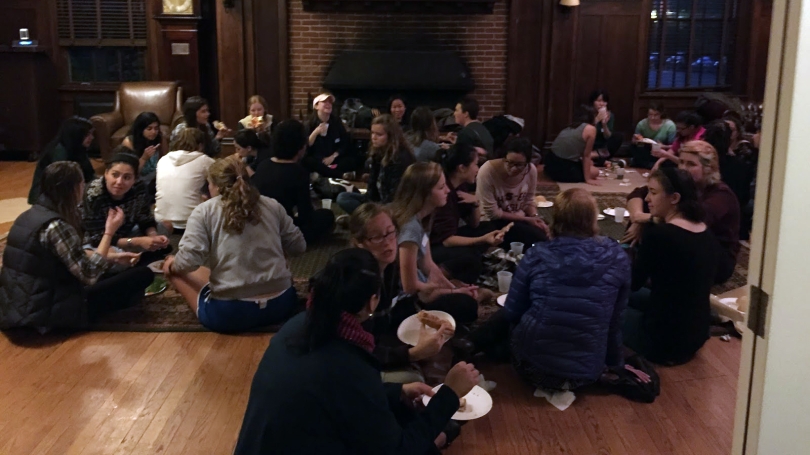
- Public Policy
- Leadership
- Funding
- News & Events
- About the Center
Back to Top Nav
Back to Top Nav
Back to Top Nav
Back to Top Nav
The Rockefeller Center’s Mini-Grants program funds on-campus student organization events
Sisters of Dartmouth was an evening event on Monday, October 5th held to celebrate collective sisterhood with an emphasis on welcoming all women, especially ’18 women who just went through rush, and women who decided not to rush or dropped out. Senior Hui Cheng ’16 explains the purpose of the event and an unexpected turnout.
“When we’re first introduced to Dartmouth as freshmen, the dominant narrative about college life tends to be one of inclusivity. We’re made to feel as though there’s a place on campus for everyone, and we are encouraged to see Dartmouth through structures intended to guide first-year students along their adjustment period – DOC Trips, UGAs, first-year advisors and mentors. Social identities are much more fluid. There is a freshman floor and trippees and freshman affinity groups for people to fall back into, regardless of identity.
Sophomore year, much of that changes. People join Greek houses and begin to develop their social networks in the context of their house. For many, their Greek house serves as their primary source of community through the rest of their time on campus. This can be a very positive experience for students involved, but it can be difficult for others to feel welcome and included on campus without access to Greek spaces and events. As a woman who decided not to join a sorority my sophomore fall, I have felt this sentiment very strongly throughout my time at Dartmouth, and wanted to create change for other women during my last year on campus.
Is there a place where all could find community, regardless of Greek affiliation, class or organizational involvement? Through our shared identity as women of Dartmouth, I believed we could, and I hoped to emphasize this through the Sisters of Dartmouth event. We hoped to provide a space of celebration on campus where all women, affiliated or unaffiliated, could feel welcome, and celebrate their collective sisterhood as Women of Dartmouth. For the 60 sophomore women who dropped out of rush, the ones who did not rush at all, or the freshmen wondering about Greek life, we hoped to connect them to upperclasswomen who could offer their perspective from years at the College. In theory, I thought this was an encouraging message, and I and other organizers of the event received a great deal of positive feedback from other women.
On event night, almost 60 women attended. Unfortunately, the majority of these were upperclasswomen. They came, hoping to meet ’18s and ’19s and have conversations with them about their experience on campus, about finding community inside and outside of their sororities and begin new friendships. Each person who came in the door expressed her excitement about the event, but as upperclasswomen began to leave, it was very evident that a large part of our goal had not been achieved. Where were the ’18s? Where were the ’19s? I debriefed with the other co-directors afterward and we weren’t sure what had happened – was this an issue of timing? Was it due to marketing? Was it because women still wanted to recover emotionally from rush? In the end, we decided that it was likely due to the nature of the discussion. Greek life, its issues and impact on social life is not apparent until the end of sophomore winter; as a result, underclasswomen may not think about the significance of or need for more inclusive communities. This was a discouraging thought, but at the same time, we all agreed it was necessary to set a precedent for the future. Those who wanted to plan the same event in years after could benefit from our best practices and lessons learned, and having the event would remind others that the status quo wasn’t inevitable. Although Sisters of Dartmouth did not have our intended result, we were excited about the prospect of bigger and better versions to come.”
-Written by Hui Cheng ’16